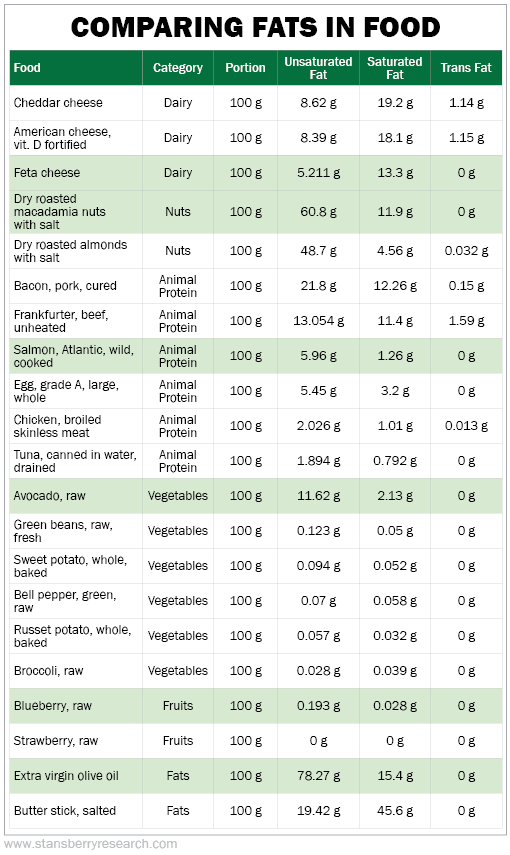Every 40 seconds, someone in the U.S. has a stroke.
That adds up to about 795,000 Americans having a stroke every year. More than 140,000 of those people die.
That's why media outlets are going wild for a new study presented at the American Heart Association Scientific Sessions 2021.
The study's researchers analyzed 27 years of data from 120,000 health care professionals. They found that the type of fat we eat – rather than the amount of fat we eat – is associated with our risk of experiencing a stroke...
- People eating more fats from veggies were 12% less likely to experience a stroke.
- People eating more fats from meat were 16% more likely to experience a stroke.
- Eating fat from dairy products was not associated with stroke risk.
While the study isn't peer-reviewed yet, it's in line with what we've told readers for years...
Not all fat is bad.
Our bodies use fat as energy, insulation, and padding to protect our organs. Fat helps the body store important fat-soluble vitamins (A, D, E, and K) for later use. Fat helps our cells grow. It helps our wounds heal. It helps our bodies make hormones. It supports the retina and makes our eyes work. Essential fatty acids – like omega-3s – are necessary for building our brain structures. They also act as messengers in the nervous system. In fact, 60% of the average adult brain is fat.
Without fat, we can't function. But not all fat is created equal...
There are three main types of fat:
- Unsaturated fat – This type of fat is the easiest for our bodies to break down and use for energy. You'll see its two forms – monounsaturated and polyunsaturated – on a nutrition label. Omega-3 fatty acids, found in fish, are a type of polyunsaturated fat. Unsaturated fat tends to be liquid at room temperature – like olive oil.
- Saturated fat – This type of fat takes a bit more work to break down. It tends to be solid at room temperature – like butter.
- Trans fat – This type of fat is difficult for our bodies to break down. This is the type of fat you find in processed food and should avoid.
Most foods have a combination of unsaturated and saturated fats. The key is to eat foods that have higher levels of unsaturated fats – compared to saturated fats – most of the time.
Now, let's take a look at some foods and see how their fat content stacks up. The best choices in each food category are highlighted in green...

Measure for measure, some of these findings are surprising. Blueberries have unsaturated and saturated fat. Almonds have trace amounts of trans fats. And you can really see the difference between extra virgin olive oil and butter in this breakdown. (Another reason to toss the butter and stick to olive oil.)
Not surprisingly, the most-processed food – the frankfurter – has the most trans fat of all the foods. And avocado is a standout in the vegetable category.
Unfortunately, there is no magic cure-all to protect everyone from experiencing a stroke. Some people have a higher risk than others. But we do know that choosing your food wisely may help reduce those risks and benefit your overall health.
Here are my tips on how to make good choices when it comes to eating fat:
- Make two or three days each week meat-free.
- Eat good fatty fish, like salmon and tuna.
- Eat vegetables every day. Aim to see a rainbow of color in the foods on your plate.
- Cook with extra virgin olive oil.
- Read the nutrition labels on packaged food, and steer clear of trans fat.
- The fewer processed foods you eat, the better.
- Don't avoid fat by opting for a low-fat or non-fat version of your food.
- Check out the Mediterranean diet. This is widely considered one of the best ways to eat.
And one of my best tips is – all things in moderation. Making small, incremental adjustments toward eating better makes a big difference. Enjoy your food wisely, the health and wealth way.
What We're Reading...
- Eat more fat.
- Eating fat can lower stroke risk, study says, as long as it's the right kind.
- Something else: India bets its energy future on solar – in ways both big and small.
Here's to our health, wealth, and a great retirement,
Dr. David Eifrig and the Health & Wealth Bulletin Research Team
November 16, 2021
